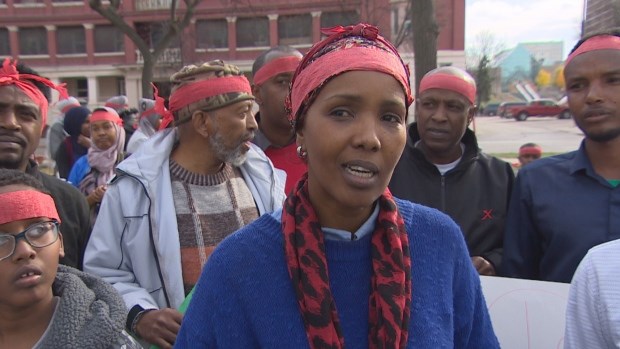
Saturday October 21, 2017
Many in Winnipeg lost friends, family in bombing say organizers

Mayran Kalah attended a vigil in Winnipeg Saturday to honour those killed in last weekend's terrorist bombing in Mogadishu, including 22 of her family members. (CBC)
Winnipeg's Somali community gathered Saturday to mourn friends and family killed in last weekend's deadly bombing at a market in Mogadishu and to bring attention to the ongoing violence in the country.
The death toll from last Saturday's bomb blast — described as the most powerful ever seen in Somalia's capital — rose to 358 as of Friday with dozens still reported missing. More than 300 people were also injured in the attack when a truck loaded with explosives detonated near a crowded market.
Mayran Kalah, who came to Canada 26 years ago as a refugee to escape the violence in Somalia, attended Saturday's vigil in Winnipeg and told CBC News she lost 22 family members in the blast.
"Those were our cousins, my aunties' kids — some are still missing — some are confirmed dead," she said.
"What is making us so hurtful right now is because we don't even know. There's some still missing and my family is calling and telling me 'I think we've buried so-and-so but it was just body parts'."
"We're emotional, we're horrified, and we want the killing to stop."
Officials in Somalia have blamed the al-Shabaab extremist group for the bombing. Somali intelligence officials told the Associated Press the truck — which carried a bomb estimated to weigh between 600-800 kilograms — was meant to target Mogadishu's heavily fortified international airport but instead exploded in the crowded street after soldiers opened fire.
Kalah said nearly everyone who gathered for the vigil held Saturday afternoon at Central Park has lost a friend or family member in the blast, and the community gathered Saturday because most were working last weekend and haven't had a chance to meet and mourn. Many wore red bandanas to represent the blood lost in the attack.
"The feeling here is emotional but we're still going." she said.
Civil war started in 1991
Until 2011, al-Shabaab, an extremist group, controlled Mogadishu and much of Somalia and imposed a strict version of Shariah law. The militant group rose out of Somalia's civil war, a conflict that began in 1991 and is still considered ongoing in the country.
Although the group's hold on the country has weakened, it still carries out deadly attacks, including one in Mogadishu in January which killed 28 people. Last Saturday's bombing is the deadliest single attack Somalia has ever seen.
"I'm not going to say we're used to it , but this is expected if you're from Mogadishu," said Kalah. "We've been expecting stuff like this since 26 years ago."
As well as the violence, Somalia is experiencing a devastating drought that has led to famine which could affect 6.2 million people, according to estimates from the United Nations.
It is the third famine in the country in 25 years; a 2011 famine killed nearly 260,000 people.
The violence and devastation has led to years of exodus from the Horn of Africa country, including the influx of Somali refugees Manitoba has seen coming over the U.S. border over the last year.
Mahdi Warsame, who attended the vigil after arriving in Winnipeg from the United States just two weeks ago, said last weekend's bombing shows why Manitobans need to welcome refugees like him from Somalia.
"They don't need no more facts, they had a real fact Oct. 14 with what happened in Mogadishu — Mogadishu is not safe," he said.
"I want immigration to understand that we are here for our safety, we are not here to take the Canadian resources … we want to live peacefully like regular people."
With files from The Associated Press and Kelly Malone